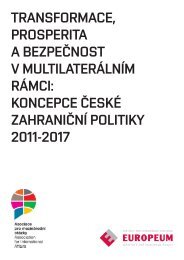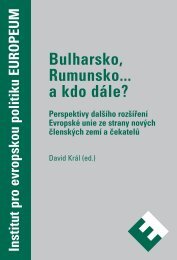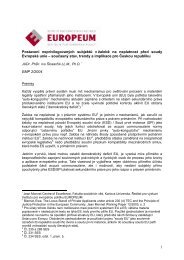eu constitutionalisation - EUROPEUM Institute for European Policy
eu constitutionalisation - EUROPEUM Institute for European Policy
eu constitutionalisation - EUROPEUM Institute for European Policy
You also want an ePaper? Increase the reach of your titles
YUMPU automatically turns print PDFs into web optimized ePapers that Google loves.
Chapter 1: Constitutionalisation: the Case of the Convention as a Network Analysistated the subsequent wider agreement.⁶² The Franco-German tandem wasbolstered by close cooperation with other countries, mainly the Beneluxcountries, Italy, or – on some issues – Britain.British–Spanish cooperation was rooted in common support <strong>for</strong> the Iraq warand stressed the necessity to preserve as many intergovernmental features aspossible, especially in the field of security and <strong>for</strong>eign policy. Also the commonposition of Spain and Poland was quite utilitarian and concentratedmainly on the preservation of the Nice QMV system, where both had wongenerous voting allocations. (Germany with 82 millions citizens has 29 voteswhile Poland and Spain with around 40 millions of inhabitants operatewith 27, the Czech Republic with 10.5 millions has 12 votes.) The Polish andSpanish partnership developed more during the IGC due to other sharedinterests as medium-sized countries. Poland vacillated between seeing itselfas the “smallest of the big” states or the “biggest of the small” ones.⁶³During February and March 2003, the group of so-called “like minded countries”,or the “friends of the community method”, was established. This groupinvolved most of the small and medium-sized countries, and the most activerole was played by Portugal, Ireland, Austria and Finland.⁶⁴ This group wasat times joined by Sweden and Denmark, who nevertheless had reservationsagainst some of its positions and e.g. accepted the role of the permanent Chairof the <strong>European</strong> Council. The Benelux played a certain double role, with firstjoining the group of like-minded states and later associating themselves morewith the French-German tandem. This applied mainly to the Netherlands andLuxembourg. The liked minded countries group was joined by nearly all thenew member states: the Czech Republic, Slovakia, Slovenia, Hungary, Estonia,Lithuania and Latvia. Malta and Cyprus also played active role.⁶⁵62) The author had a chance to participate at several closed meetings in Brussels or Berlin where Fischer metrepresentatives of new member states in different <strong>for</strong>mations. At those occasions, he was explainingthe foundations of French-German proposals, the attitudes of France and the attitudes of Germany andthe final wording. He was very carefully listening to the arguments of his counterparts and he tried toincorporate their worries and wishes to the proposals. As an example can serve the requirement of thestrictly equal rotation in the <strong>for</strong>mations of the Councils of Ministers, which was not in the draft of thePresidium of the Convention and was threatening the result of the Convention in June 2003.63) The Economist, <strong>European</strong> Union Enlargement, Big brother is still watching64) The author was present at the meeting in the Portuguese permanent representation to the EU when thegroup was established.65) The meeting of the group of like minded countries was held during the last days of the Convention inJuly 2003. All above mentioned countries took part and expressed their willingness to coordinate theirattitudes during the upcoming IGC. They also accepted to invitation <strong>for</strong> the meeting of the group organizedin Prague at the Ministry of Foreign Affairs on September 1, 2003.40Chapter 1: Constitutionalisation: the Case of the Convention as a Network AnalysisThe group’s main aim was to preserve of the principle of equality of memberstates and to safeguard the community method (preserve a strongCommission). One of the main tasks was the conservation of the principleof equal rotation in the chair of the Council and the principle “one country,one Commissioner” in the <strong>European</strong> Commission. In the course of theConvention, the membership of the grouping kept changing, and at theend even Britain supported the idea “one country, one Commissioner”.Poland, which did not join the group, did nevertheless express manysimilar views. Poland even took part at the meeting of the initial pre-IGCmeeting of the group in Prague in September 2003. It was not difficult <strong>for</strong>the Czech delegation to join the group, because the Czech governmentalcontribution (the “Non paper”), officially submitted in January 2003, wasnearly identical to the proposals of the group.⁶⁶After the end of the Convention, the group of like-minded countries metagain officially on 1 September 2003 in Prague. High representatives (statesecretaries) of fifteen countries introduced their expectations from the IGC.The Benelux countries decided not to participate at the last moment. Polandhad intended to send its Minister <strong>for</strong> Europe, but in the event it was representedby the Ambassador to the Czech Republic instead. The main concernof the states’ representatives present was not to <strong>for</strong>m an institutionalframework <strong>for</strong> consolidating cleavages among member states. Especiallythe representatives of Sweden, Denmark, Greece and Ireland expressedtheir worries openly. The countries present were mainly focussed on theirown national priorities, giving them a “communitarian” outlook. It waspossible to state that the countries present accepted the idea of a permanentChair of <strong>European</strong> Council if the equal rotation on the level of MinisterialCouncils was preserved. More often, the ef<strong>for</strong>t to preserve the requirement“one country, one Commissioner” was stressed. The principles of efficiencyand democracy do not necessarily go hand in hand.⁶⁷To consider this group to be truly “like minded” would be an overestimation.These small states were worried about the extension of the relativeinfluence of the big states, and about the speed of this extension. Theyconsidered the proposals of the big states to stress too much the role ofnation states, which would consequently give more power to bigger coun-66) <strong>European</strong> Convention, Non paper on the re<strong>for</strong>m of EU institutions67) Minutes from the meeting of “like minded countries” were taken by the author, 1 September 200341








